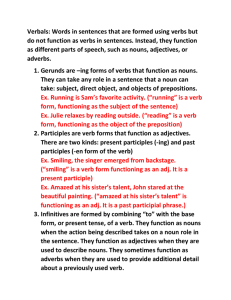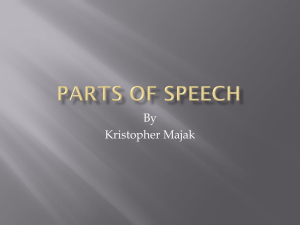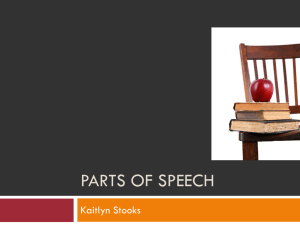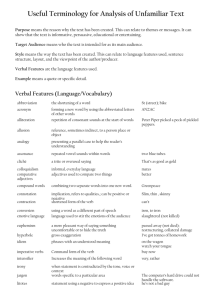Words - MiraCosta College
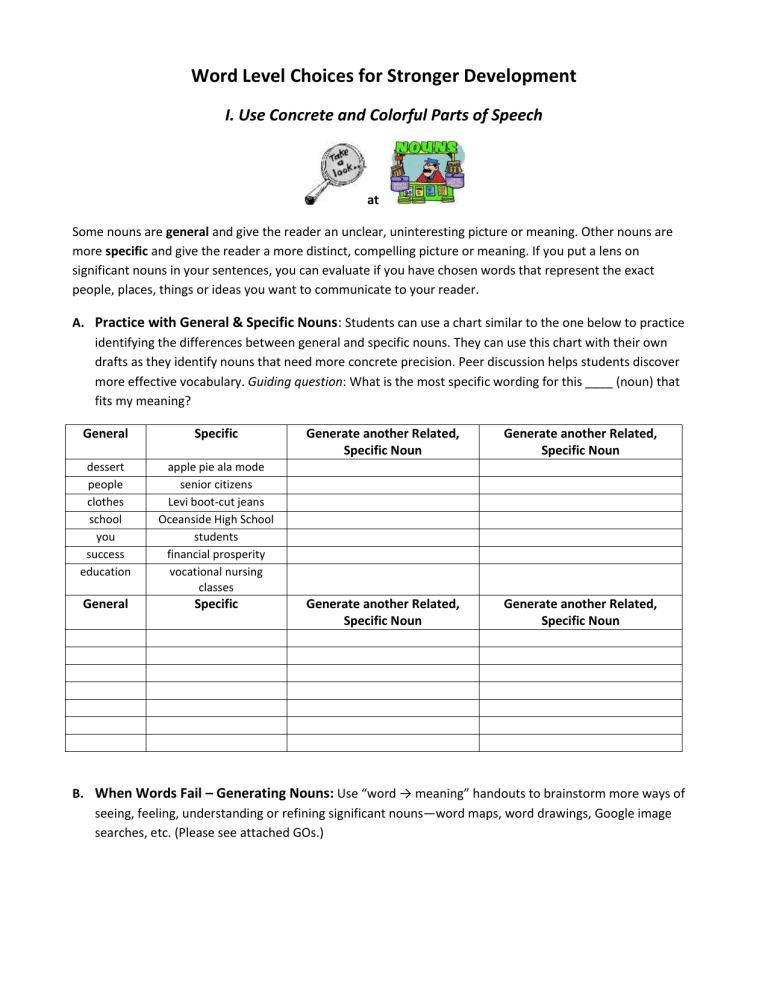
Word Level Choices for Stronger Development
I. Use Concrete and Colorful Parts of Speech
at
Some nouns are general and give the reader an unclear, uninteresting picture or meaning. Other nouns are more specific and give the reader a more distinct, compelling picture or meaning. If you put a lens on significant nouns in your sentences, you can evaluate if you have chosen words that represent the exact people, places, things or ideas you want to communicate to your reader.
A.
Practice with General & Specific Nouns:
Students can use a chart similar to the one below to practice identifying the differences between general and specific nouns. They can use this chart with their own drafts as they identify nouns that need more concrete precision. Peer discussion helps students discover more effective vocabulary. Guiding question: What is the most specific wording for this ____ (noun) that fits my meaning?
General dessert people clothes school you success education
General
Specific Generate another Related,
Specific Noun apple pie ala mode senior citizens
Levi boot-cut jeans
Oceanside High School students financial prosperity vocational nursing classes
Specific Generate another Related,
Specific Noun
Generate another Related,
Specific Noun
Generate another Related,
Specific Noun
B.
When Words Fail – Generating Nouns:
Use “word → meaning” handouts to brainstorm more ways of seeing, feeling, understanding or refining significant nouns—word maps, word drawings, Google image searches, etc. (Please see attached GOs.)
at
A. Vivid Verb Guidelines: These two basic suggestions can serve as lenses for evaluating verb choices. First, you can model examples of these guidelines within context. Then students can put these two lenses on their own sentences to identify verbs that can be improved.
Use verbs that show rather than tell.
Vague Verb: Some people leave school without a good education.
Show Verb: Many students graduate high school without adequate preparation for college studies.
Vague Verb: Students like being rewarded with good grades.
Show Verb: Students depend on the positive feedback they receive from earning A’s and B’s.
Avoid overusing “be” verbs (is, are, was, were, etc.). Instead aim for direct subject-verb arrangements.
“Be verb”: The charity is doing a good job for the community.
Direct Verb: the charity helps the community in significant ways.
B.
Practice with General & Specific Verbs: Students can use a chart similar to the one below to practice identifying the differences between general (hazy) and specific (distinct) verbs. They can use with their own drafts to identify verbs that can be improved. Peer discussion about different verb choices helps build vocabulary. Guiding question: What ____ (verb) would most vividly convey my precise meaning for this sentence, paragraph, and essay?
General looked done said had needs made up
General
Specific glared, examined completed claimed experienced craves, requires imagined
Specific Generate another Related, Specific
Verb
Generate another Related, Specific
Verb
Generate another Related, Specific
Verb
Generate another Related, Specific
Verb
C.
When Words Fail – Generating Verbs: As with nouns, students often need to brainstorm words with their peers, in small groups or as a whole class. They can use “word → meaning” handouts to brainstorm more vivid ways of expressing action or states of being. (Please see attached GOs.)
at
Adjectives & Adverbs
Some adjectives are general and give the reader a vague, repetitive description. Other adjectives are more
specific and give the reader a more detailed, focused description. Each adjective you choose should make
your nouns clearer and more interesting for the reader. Put a lens on words that you are using to modify your nouns.
A. Specific Adjective Suggestions. You can put these 2 codes on an index card and Ss’ provide their own examples as they put a lens on nouns that need help. Help Ss compare and contrast weak/strong adjectives within context.
Avoid using adjectives that are general, repetitive and bland.
EXs: good, bad, small, little, big, large, better, worse, great, fun, nice, pretty, ugly, wonderful, happy, sad…
General Adjective: Everyday superheroes make a better world.
Replace the generic adjective “better” with more specific descriptions.
Specific Adjective(s): Everyday superheroes create a more compassionate, just world.
B. Ongoing List of Blah Adjectives: Students could add to the above list of general, blah adjectives. Discuss why we tend to revert to generic words and how to generate more effective alternatives.
A. Specific Adverb Suggestions
: Students can circle significant verbs and brainstorm ways to create sharper mental images using adverbs. Guiding Question: What ______ (adverb) would support the verb and context of this sentence, paragraph and essay?
Use an adverb if the added detail will help the reader “see” the action or experience better.
No Adverb: I sat in the back of the class to avoid answering questions.
Vivid Adverb: I anxiously sat in the back of the class to avoid answering questions.
II. Hire the Right Word for the Job: Connotations
Even though students can look up synonyms in the dictionary or thesaurus, we want to help them understand how each word has its own special “twist” on the core meaning (its connotation). Adapt the below practice by using key vocabulary words that are relevant to their essay meanings. Learning Outcomes include . . .
(1) Help students understand that words have different meanings even within one categorical definition.
(2) Guide students through prior knowledge, context and discussion building approaches to brainstorm connotations.
(3) Guide students to choose the right word for the job--that matches their specific purpose.
For example, a Thesaurus search in WORD for “dream” produces the following results:
5.
Noun
vision daydream reverie nightmare hallucination delusion
Noun
fantasy pipe dream castle in the sky
Noun
aspiration wish goal hope ambition desire
Verb
fantasize visualize imagine fancy envisage hallucinate
Noun
delight joy pleasure marvel ideal
Strategies to Find the Right Word
1. Brainstorm: Use a Word Map to brainstorm the extended, deeper, and distinct meanings of relevant words in the above list.
2. Discussion: Discuss the “feelings” or “impressions” behind different synonyms. Discuss different “reader” interpretations of words.
3. Draw: Draw pictures that illustrate interpretations of the different connotations.
4. Compare/Contrast different connotations: For example, how is the meaning of “fantasy” different than “ambition”?
How is “fantasizing” different than “visualizing”?
III. Cut out Clichés
Help students identify overused words or phrases that are often used mindlessly in casual conversation.
Discuss why we tend to use these “sayings” while talking but how they are ineffective for meaningful writing.
Highlight how clichés are actually generic--too broad to fulfill the needs of development.
Cliché: People should think before they leap.
Specific: A person should think through an important decision before taking impulsive action.
Practice with Writing:
Look through your writing, identify other types of clichés, and record in the box below. Discuss the general meanings of the cliché, how it functions (or does not function) in academic essays, and alternative wordings to develop specific meanings. after all is said and done grin and bear it food for thought believe it or not beat around the bush in a nutshell best foot forward in the nick of time cart before the horse come through with flying colors crying shame easier said than done
_____________________
_____________________
_____________________ better late than never calm before the storm no time like the present don’t rock the boat see eye to eye
_____________________
_____________________
_____________________ in one ear and out the other last but not least more than meets the eye put your foot in your mouth drop in the bucket face the music
_____________________
_____________________
_____________________
Cliché list from Writers Inc, Patrick Sebranek, Dave Kemper, and Verne Meyer. Houghton Mifflin, 2006, p.92.
IV. The Problem with “You”
Since “you” is a pronoun, discussion of its ineffective usage can be integrated into lessons & practice about using specific nouns.
Practices with Sample Essays (attached): Using the attached Sample 1 Paragraph, brainstorm reasons why
“you” undermines the effective and interesting development. Help students develop an audience awareness of how “you” means different things to different readers. Also, how does “you” affect the writer’s tone and credibility? Then contrast to Sample 2 Paragraph to identify more specific wordings for “you.”
1. “You” is considered too informal in academic writing because it assumes a shared understanding of the “person” with the reader.
2. “You” is considered to general in academic writing, especially because it is often used to refer to a huge range of people.
3.
V. Pruning Dead Wood (Words)
The Purdue OWL website recommends that students “check every word in a sentence to make sure that it is
providing something important and unique to a sentence.” Please see this website for explanation and examples of more pruning examples: http://owl.english.purdue.edu/owl/owlprings/572/ , “Conciseness.”
Chop Unnecessary Words
Wordy: At this point in time, this charity is best known for its help to people with different needs related to being out of work.
Concise: Currently this charity is most recognized for providing services for the unemployed.
Prune Flowery Language
Wordy: The tall, angst-ridden woman damaged her pristine reputation by arrogantly pretending to supersede her employee’s arduous expectations.
Concise: The woman damaged her reputation at work by falsely representing her abilities.
Rake out Repetitive Wording
Wordy: In this culture, swaggers express themselves through colorful clothing that they wear to show their creative sides.
Concise: Swaggers use colorful clothing to express their creativity.

